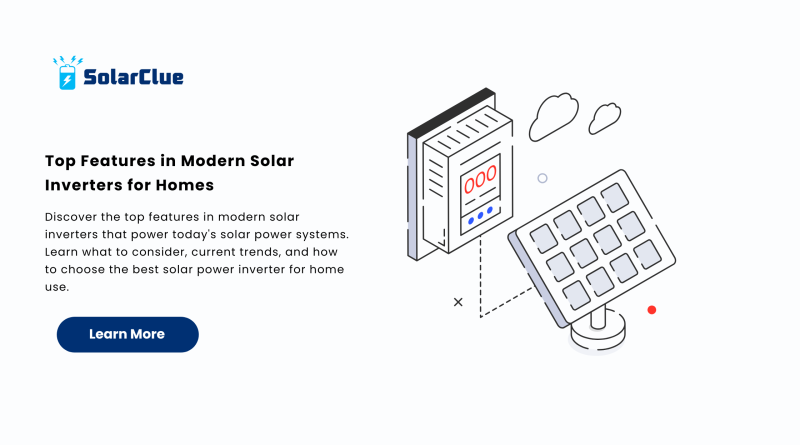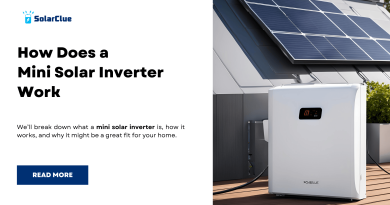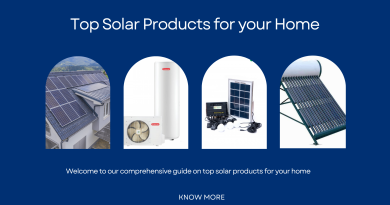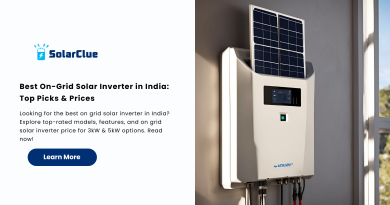Top Features in Modern Solar Inverters for Homes
In recent years, the shift towards renewable energy has made solar one of the fastest-growing sectors in the world. At the heart of any efficient solar power system is the solar inverter, the essential component that converts the sun’s DC energy into usable AC electricity. But not all inverters are made equal. As technology advances, Top Features in Modern solar inverters for Homes come packed with innovative features that make them more efficient, reliable, and intelligent than ever before.
Let’s explore the must-have features of today’s solar power inverters for home use, and how you can ensure you’re making the most informed choice.
Table of Contents
- 1 High Conversion Efficiency
- 2 Smart Monitoring and Connectivity
- 3 Battery Compatibility
- 4 MPPT Technology
- 5 Safety Features and Compliance
- 6 Modular and Scalable Design
- 7 Silent Operation
- 8 Weatherproof and Durable
- 9 Affordable and Competitive Solar Inverter Price
- 10 Grid-Tie and Off-Grid Compatibility
- 11 Compact and Aesthetic Design
- 12 Over-the-Air (OTA) Firmware Updates
- 13 Load Prioritization
- 14 Brand Reputation and Warranty
- 15 Integration with Smart Home Systems
- 16 Environmental and Financial Benefits
- 17 Conclusion
- 18 FAQs
High Conversion Efficiency
One of the most important features to look for in a solar inverter is its conversion efficiency. Modern inverters boast efficiencies of over 97%, minimizing energy loss during the DC to AC conversion process. Higher efficiency means more savings on your electricity bill and quicker return on investment.
Smart Monitoring and Connectivity
Today’s solar power inverters are smarter than ever. They come equipped with built-in Wi-Fi or Bluetooth, allowing homeowners to monitor energy production, usage, and even system health from their smartphones or computers. This ensures you’re always in control of your energy.
Battery Compatibility
With the rise of energy storage solutions, modern solar inverters often come hybrid-ready, meaning they can work seamlessly with battery backup systems. Whether you’re installing a new solar power system or upgrading an existing one, inverter compatibility with batteries adds long-term value.
MPPT Technology
Maximum Power Point Tracking (MPPT) is now standard in high-quality inverters. MPPT ensures your solar panels operate at their maximum efficiency by constantly adjusting the inverter’s input to achieve the best power output, especially during fluctuating weather conditions.
Safety Features and Compliance
Good solar power inverters for home use must meet safety certifications and offer features such as surge protection, ground fault protection, and temperature monitoring. These features ensure the safety of both your home and the electrical system.
Modular and Scalable Design
Whether you start with a small solar power system or plan to expand in the future, choosing an inverter with modular capabilities can save you time and money. Many models support parallel connections for scaling up without replacing the core inverter unit.
Silent Operation
Older inverters used to make noticeable humming sounds, but modern models are designed for near-silent operation. This is especially important for residential installations where noise can be an issue.
Weatherproof and Durable
Most inverters are installed outdoors, making weather resistance essential. IP65 or higher ratings indicate that an inverter can withstand dust, heat, and water splashes, ensuring long-lasting performance in diverse climates.
Affordable and Competitive Solar Inverter Price
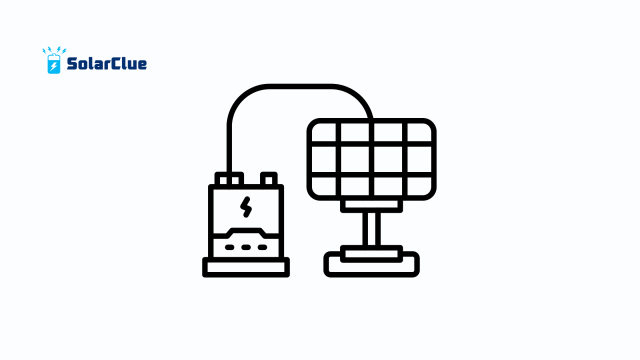
Thanks to innovation and mass production, solar inverter prices have become more affordable. However, it’s essential to balance cost with features. Avoid compromising on safety and efficiency just to save a few bucks.
To get the latest and most competitive solar inverter price, visit SolarClue.com and browse their wide range of high-efficiency inverters.
Grid-Tie and Off-Grid Compatibility
Depending on your location and preferences, you might need a grid-tied or off-grid inverter. Some models also offer hybrid functionality, letting you switch modes as needed—ideal for areas with unreliable electricity supply.
Compact and Aesthetic Design
Modern inverters are not only functional but also aesthetically designed to blend into your home environment. Compact form factors save space and simplify installation.
Over-the-Air (OTA) Firmware Updates
As more inverters become IoT-enabled, manufacturers now offer OTA firmware updates. This means your solar power inverter can continuously receive software improvements and new features without needing hardware replacements.
Load Prioritization
Advanced inverters allow you to prioritize specific household loads during power shortages. This feature is vital in areas with frequent power cuts, ensuring your most important appliances always stay on.
Brand Reputation and Warranty
Stick with reputable brands that offer long warranties (at least 5-10 years). Reliable customer service, quality assurance, and long-term support are critical in such a significant investment.
Integration with Smart Home Systems
Smart homes are becoming the norm, and solar inverters that integrate with Alexa, Google Home, or other home automation systems offer added convenience and energy optimization.
Environmental and Financial Benefits
Choosing a feature-rich solar inverter maximizes your system’s performance, contributing to both environmental sustainability and significant cost savings. You’re not just buying a device; you’re investing in your energy independence.
Conclusion
Modern solar inverters are no longer just power conversion devices; they are intelligent, safe, and essential to optimizing your home’s solar power system. Whether you prioritize solar inverter price, connectivity, or efficiency, making the right choice can significantly impact your system’s performance and your overall satisfaction.
For detailed reviews, pricing, and installation advice, check out the latest articles at blog.solarclue.com and explore how to make solar work for you.
FAQs
Q1. What is the best solar inverter for home use?
Modern brands like Sungrow, Growatt, and Fronius are popular for their reliability, efficiency, and smart features.
Q2. How much does a solar inverter cost in India?
The solar inverter price can range from ₹10,000 to ₹1,00,000 depending on the type, capacity, and brand.
Q3. Can I use an inverter without batteries?
Yes, grid-tied inverters do not require batteries and are ideal for locations with stable electricity supply.
Q4. How long does a solar inverter last?
A good quality solar inverter can last 10-15 years or more with proper maintenance.
Q5. Do solar inverters require maintenance?
Minimal maintenance is required. Keeping the inverter cool, dry, and clean ensures longevity.
Ready to elevate your home energy game? Visit us now at SolarClue.com and discover your path to sustainable power!

